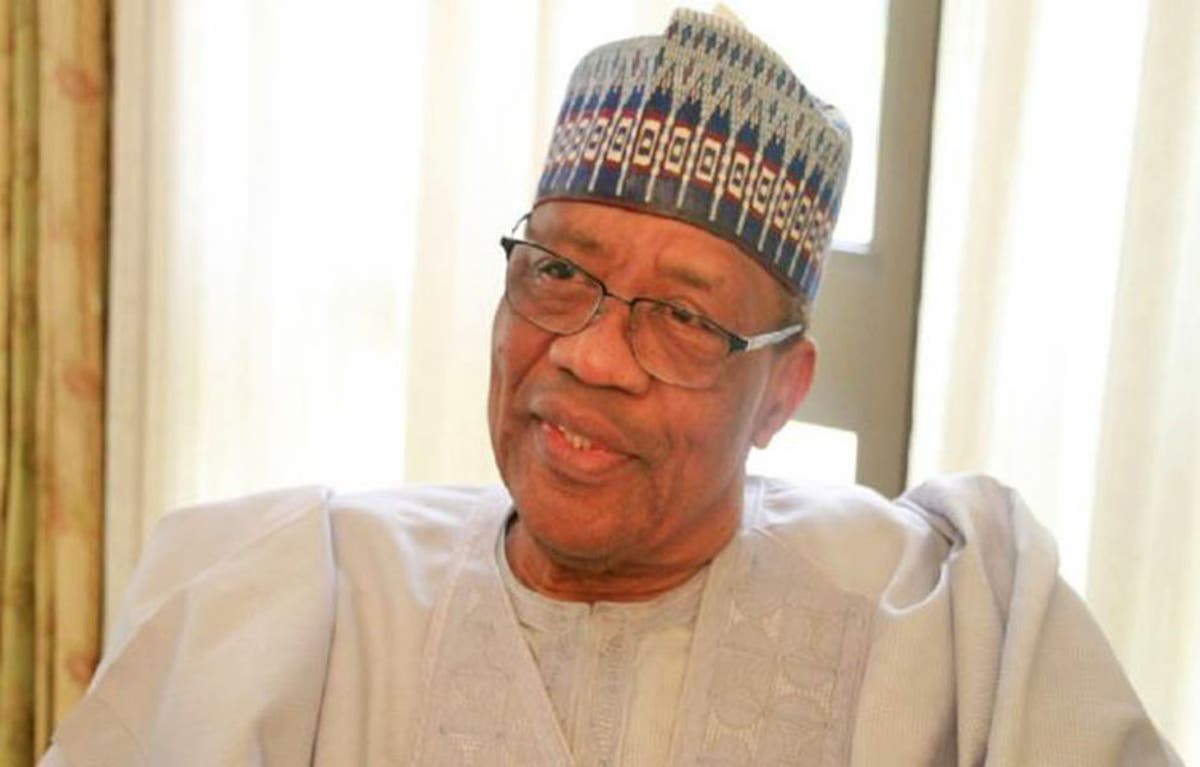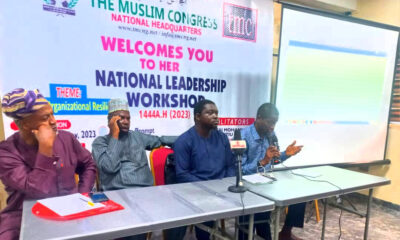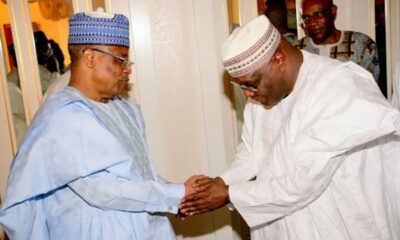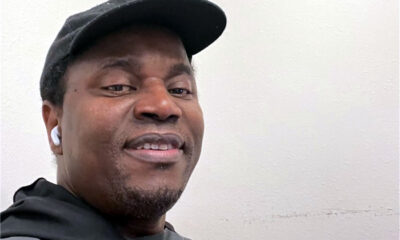Opinion
Farooq Kperogi : Identity questions in IBB’s autobiography

Farooq Kperogi : Identity questions in IBB’s autobiography
The autobiography of former self-styled “President” Ibrahim Badamasi Babangida has already been parsed for its self-serving mendacity, moral spinelessness, maddening insensitivity, self-glorification, and cowardly posthumous smears of dead colleagues.
I won’t revisit those points here. As someone who has a scholarly interest in—and is actually working on a book on—the rhetoric of collective identity construction in Nigeria, I was drawn to IBB’s self-definition of his identity in his autobiography.
It was Gimba Kakanda, SA to the Vice President and former newspaper columnist, who first quickened my appetite about this in his February 19 Facebook update.
Kakanda had read an advance copy of IBB’s autobiography and wrote this intriguing summation of it: “It’s a journey that begins with his origins, as the son of a Gbagyi woman, and leads up to the June 12 questions—the answers to which you’ll have to read to discover for yourself.”
In a February 15, 2020, column titled “True Ethnic Origins of Nigeria’s Past Presidents and Heads of State,” I had observed that “IBB’s ethnic identity is surprisingly a magnet for controversy and speculation. He has been called Gbagyi (whom Hausa people call Gwari), Nupe, and even Yoruba from Ogbomoso or Osogbo. But he told journalists and his biographers at different times that his immediate ancestors were Hausas from Kano who migrated to what is now Niger State.”
I was curious if IBB admitted that his maternal filiation was Gbagyi (or Gwari). He actually did. But while he is very specific about his maternal line of descent, he was vague about the ethnic identity of his paternal ancestry.
This is how he describes his paternal ancestry, beginning from his grandfather: “Snippets of details I heard suggested that earlier on, he was a bit of a wanderer, migrating from Sokoto to Kano and Kontagora and settling in Wushishi.”
Contrast this with the specificity with which he describes his maternal heritage: “Apparently, [my grandfather] met his future wife, a young Gwari girl called Halima, in Wushishi, and since his future parents-in-law would only allow him to marry daughter if he agreed to make his home in Wushishi, he readily complied with their condition before settling down in Wushishi and marrying his pretty wife, Halima.”
READ ALSO:
- Ikeja Military Cantonment renamed after late COAS Lagbaja
- Fears of fresh fuel crisis as govt implements ban on 60,000-litre trucks today
- Trump clashes with Ukrainian President Zelensky, accuses him of gambling with World War III
In yet another description of his Gwari maternal descent, he is informatively direct and specific: “But before he left, my father met and married a beautiful light-skinned Gwari girl, Inna Aishatu, who would become my mother.”
His paternal grandmother was a pretty Gwari woman, and his own mother was a “beautiful light-skinned Gwari girl.” Why did he have a need to call attention to their pulchritude and complexion?
Why did he withhold such details about his grandfather and his father? Sokoto, which he says is the apparent root of his paternal ancestry, was populated by both the Fulani and the Hausa in the “later part of the 19th century” when his grandfather left it for Kano and later Wushishi.
Although interethnic marriage between the Hausa and the Fulani began to intensify at this time, people still identified their heritage through their fathers. Ethnic identities or labels weren’t hyphenated. Was his father Hausa or Fulani?
Did he, perhaps, obliquely answer that question by gratuitously calling attention to the light skin of his Gwari mother in order to let it be known that his own light complexion is inherited from his mother since the Fulani are stereotypically light-skinned?
Well, IBB told a biographer that his great grandfather hailed from the village of Kumuria [Kumurya?] in Kano State from where he went to Sokoto. But in his autobiography, he only mentions his grandfather migrating from Sokoto to Kano and later to Wushishi. Is this intentional, strategic paternal ancestral ambiguity?
We see evidence of identitarian anxieties in IBB’s life after he left his Niger cultural cocoon. Up until age 23 when he returned from India as a Second Lieutenant, his name was Ibrahim Badamasi, Badamasi being his father’s first name.
“However,” he writes, “before I settled down to work at the First Brigade, a particular incident led me to add ‘Babangida’ to my name. During official engagements that led to my deployment to Kaduna, officers who confused the Yoruba name, Gbadamosi, with my last name, ‘Badamasi,’ repeatedly asked me whether I was Yoruba. That question had come up a few times during my enlisting interview for the military. Since that question persisted (and since I knew I wasn’t Yoruba!), I decided to take on my father’s other name as my last name.”
Three things jumped out at me after reading this part of the book. First, I find it intriguing that he had no hesitation telling us about his mother’s and paternal grandmother’s ethnic identity and even disclaiming a Yoruba identity that he knew would constrain him but chose to conceal his paternal ethnic identity.
Second, IBB didn’t mention Babangida as his father’s other name when the reader first encounters him in the book. He identifies his father as Muhammad Badamasi, not Babangida Badamasi. Maybe this oversight is attributable to sloppy (ghost) writing.
READ ALSO:
- 18-year-old girl drugs boyfriend to steal his N4m in Ibadan
- My husband is a disciplined man, didn’t sexually harass Natasha – Akpabio’s wife
- Wike rejoices after Supreme Court judgement against Rivers govt
Third, Gbadamosi is not, strictly speaking, a Yoruba name. It’s the Yoruba domestication of Badamasi, which is understood to be a Muslim name in Nigeria. Many people in northwest Nigeria, where he says his paternal roots sprouted from, bear the name.
When I wrote about unusual Muslim names in Nigeria that don’t seem to have any links with the rest of the Muslim world, among which is “Badamasi,” readers who are familiar with the etymology of Badamasi told me that the name (which was probably originally some variant of Badmasi) belongs to an Arabic poet whose book advanced students in traditional Arabic schools, called makarantun soro in Hausa land, study.
The book, a Sufi poem, is used as a resource for Arabic vocabulary lessons. Over time, it became popularly known as Badamasi, named after its author.
I haven’t found any scholarly corroboration for the claim that Badamasi is the name of an Arab poet, but there is a late nineteenth-century Ilorin Muslim scholar and poet by the name of Badamasi whose poems are often utilized to enhance Arabic vocabulary and are a staple in the curriculum of traditional Islamic schools. But it’s not clear if he is the original bearer of the name.
Badamasi was Yorubized to Gbadamosi and later anglicized to Badmus in Yoruba land.
Curiously, Muslim names, which should transcend, even neutralize, ethnicity, at least on the surface, can become the carriers of the weight of ethnicity in Nigeria. There are notions of “Yoruba Muslim names” not just because of their peculiar Yoruba domestication but because of their higher than usual frequency among Yoruba Muslims.
For example, many northern Muslims and Yoruba Muslims have concluded, without a shred of evidence, that House of Representatives Speaker Tajudeen Abbas is a Zaria man of Yoruba ancestry because “Tajudeen” occurs more frequently among Yoruba Muslims than it does among Hausa-speaking Muslims.
But Tajudeen Abbas is a Zaria prince. A Yoruba editor friend of mine pushed back when I said the Speaker was at least paternally Fulani by asking which Fulani or Hausa man I knew who bore the name Tajudeen.
I mentioned Tajudeen Dantata. I then asked if he thought the Dantata family was Yoruba because they named one of their progenies Tajudeen. That ended the conversation.
Dr. Raji Bello, a Fulani man from Yola, also talks about how he is often mistaken for a Yoruba man because people assume that Raji is an exclusively Yoruba Muslim name even though it’s a Muslim name commonly born by South Asian and West African Muslims.
Dr. Bello resisted the type of urge that IBB succumbed to. He once said he was advised by an elder in Zaria to change his name to Rabiu. But he was named after one of his ancestors, a prominent nineteenth-century Muslim scholar in what is now Adamawa by the name of Modibbo Raji.
Finally, IBB described his father as a “messenger/interpreter” in the colonial district office but didn’t say what he interpreted. Since he had no Western education and didn’t speak English, did he translate Gbagyi, his mother’s language, to Hausa or vice versa?
Well, I am not done reading the book.
Farooq Kperogi : Identity questions in IBB’s autobiography
Farooq Kperogi is a renowned columnist and United States-based Professor of journalism.
Opinion
Oshiomhole: Behold the 13th disciple of Christ

Oshiomhole: Behold the 13th disciple of Christ
Opinion
AFCON 2025: Flipping Content Creation From Coverage to Strategy

AFCON 2025: Flipping Content Creation From Coverage to Strategy
By Toluwalope Shodunke
The beautiful and enchanting butterfly called the Africa Cup of Nations (AFCON) emerged from its chrysalis in Khartoum, Sudan, under the presidency of Abdelaziz Abdallah Salem, an Egyptian, with three countries—Egypt, Sudan, and Ethiopia—participating, and Egypt emerging as the eventual winner.
The reason for this limited participation is not far-fetched. At the time, only nine African countries were independent. The remaining 45 countries that now make up CAF’s 54 member nations were either pushing Queen Elizabeth’s dogsled made unique with the Union Jack, making supplications at the Eiffel Tower, or knocking at the doors of the Palácio de Belém, the Quirinal Palace, and the Royal Palace of Brussels—seeking the mercies of their colonial masters who, without regard for cultures, sub-cultures, or primordial affinities, divided Africa among the colonial gods.
From then until now, CAF has had seven presidents, including Patrice Motsepe, who was elected as the seventh president in 2021. With more countries gaining independence and under various CAF leaderships, AFCON has undergone several reforms—transforming from a “backyard event” involving only three nations into competitions featuring 8, 16, and now 24 teams. It has evolved into a global spectacle consumed by millions worldwide.
Looking back, I can trace my personal connection to AFCON to table soccer, which I played alone on concrete in our balcony at Olafimihan Street—between Mushin and Ilasamaja—adjacent to Alafia Oluwa Primary School, close to Alfa Nda and Akanro Street, all in Lagos State.
Zygmunt Bauman, the Polish-British sociologist who developed the concept of “liquid modernity,” argues that the world is in constant flux rather than static, among other themes in his revelatory works.
For the benefit of Millennials (Generation Y) and Generation Z—who are accustomed to high-tech pads, iPhones, AI technologies, and chat boxes—table soccer is a replica of football played with bottle corks (often from carbonated drinks or beer) as players, cassette hubs as the ball, and “Bic” biro covers for engagement. The game can be played by two people, each controlling eleven players.
I, however, enjoyed playing alone in a secluded area, running my own commentary like the great Ernest Okonkwo, Yinka Craig, and Fabio Lanipekun, who are all late. At the time, I knew next to nothing about the Africa Cup of Nations. Yet, I named my cork players after Nigerian legends such as Segun Odegbami, Godwin Odiye, Aloysius Atuegbu, Tunji Banjo, Muda Lawal, Felix Owolabi, and Adokiye Amiesimaka, among others, as I must have taken to heart their names from commentary and utterances of my uncles resulting from sporadic and wild celebrations of Nigeria winning the Cup of Nations on home soil for the first time.
While my connection to AFCON remained somewhat ephemeral until Libya 1982, my AFCON anecdotes became deeply rooted in Abidjan 1984, where Cameroon defeated Nigeria 3–1. The name Théophile Abéga was etched into my youthful memory.
Even as I write this, I remember the silence that enveloped our compound after the final whistle.
It felt similar to how Ukrainians experienced the Battle of Mariupol against Russia—where resolute resistance eventually succumbed to overwhelming force.
The Indomitable Lions were better and superior in every aspect. The lion not only caged the Eagles, they cooked pepper soup with the Green Eagles.
In Maroc ’88, I again tasted defeat with the Green Eagles (now Super Eagles), coached by the German Manfred Höner. Players like Henry Nwosu, Stephen Keshi, Sunday Eboigbe, Bright Omolara, Rashidi Yekini, Austin Eguavoen, Peter Rufai, Folorunsho Okenla, Ademola Adeshina, Yisa Sofoluwe, and others featured prominently. A beautiful goal by Henry Nwosu—then a diminutive ACB Lagos player—was controversially disallowed.
This sparked outrage among Nigerians, many of whom believed the referee acted under the influence of Issa Hayatou, the Cameroonian who served as CAF president from 1988 to 2017.
This stroll down memory lane illustrates that controversy and allegations of biased officiating have long been part of AFCON’s history.
The 2025 Africa Cup of Nations in Morocco, held from December 21, 2025, to January 18, 2026, will be discussed for a long time by football historians, raconteurs, and aficionados—for both positive and negative reasons.
These include Morocco’s world-class facilities, the ravenous hunger of ball boys and players (superstars included) for the towels of opposing goalkeepers—popularly dubbed TowelGate—allegations of biased officiating, strained relations among Arab African nations (Egypt, Algeria, Tunisia, and Morocco), CAF President Patrice Motsepe’s curt “keep quiet” response to veteran journalist Osasu Obayiuwana regarding the proposed four-year AFCON cycle post-2028, and the “Oga Patapata” incident, where Senegalese players walked off the pitch after a legitimate goal was chalked off and a penalty awarded against them by DR Congo referee Jean-Jacques Ndala.
While these narratives dominated global discourse, another critical issue—less prominent but equally important—emerged within Nigeria’s media and content-creation landscape.
Following Nigeria’s qualification from the group stage, the Super Eagles were scheduled to face Mozambique in the Round of 16. Between January 1 and January 3, Coach Eric Chelle instituted closed-door training sessions, denying journalists and content creators access, with media interaction limited to pre-match press conferences.
According to Chelle, the knockout stage demanded “maximum concentration,” and privacy was necessary to protect players from distractions.
This decision sparked mixed reactions on social media.
Twitter user @QualityQuadry wrote:
“What Eric Chelle is doing to journalists is bad.
Journalists were subjected to a media parley under cold weather in an open field for the first time in Super Eagles history.
Journalists were beaten by rain because Chelle doesn’t want journalists around the camp.
Locking down training sessions for three days is unprofessional.
I wish him well against Mozambique.”
Another user, @PoojaMedia, stated:
“Again, Eric Chelle has closed the Super Eagles’ training today.
That means journalists in Morocco won’t have access to the team for three straight days ahead of the Round of 16.
This is serious and sad for journalists who spent millions to get content around the team.
We move.”
Conversely, @sportsdokitor wrote:
“I’m not Eric Chelle’s biggest supporter, but on this issue, I support him 110%.
There’s a time to speak and a time to train.
Let the boys focus on why they’re in Morocco—they’re not here for your content creation.”
From these three tweets, one can see accessibility being clothed in beautiful garments. Two of the tweets suggest that there is only one way to get to the zenith of Mount Kilimanjaro, when indeed there are many routes—if we think within the box, not outside the box as we’ve not exhausted the content inside the box.
In the past, when the economy was buoyant, media organisations sponsored reporters to cover the World Cup, Olympics, Commonwealth Games, and other international competitions.
Today, with financial pressures mounting, many journalists and content creators seek collaborations and sponsorships from corporations and tech startups to cover sporting events, who in turn get awareness, brand visibility, and other intangibles.
As Gary Vaynerchuk famously said, “Every company is a media company.” Yet most creators covering AFCON 2025 followed the same playbook.
At AFCON 2025, most Nigerian journalists and content creators pitched similar offerings: on-the-ground coverage, press conferences, team updates, behind-the-scenes footage, analysis, cuisine, fan interactions, and Moroccan cultural experiences.
If they were not interviewing Victor Osimhen, they were showcasing the stand-up comedy talents of Samuel Chukwueze and other forms of entertainment.
What was missing was differentiation. No clear Unique Selling Proposition (USP). The result was generic, repetitive content with little strategic distinction. Everyone appeared to be deploying the same “Jab, Jab, Jab, Hook” formula—throwing multiple jabs of access-driven content in the hope that one hook would land.
The lesson is simple: when everyone is jabbing the same way, the hook becomes predictable and loses its power.
As J. P. Clark wrote in the poem “The Casualties”, “We are all casualties,” casualties of sameness—content without differentiation. The audience consumes shallow content, sponsors lose return on investment, and creators return home bearing the “weight of paper” from disappointed benefactors.
On November 23, 1963, a shining light was dimmed in America when President John F. Kennedy was assassinated.
As with AFCON today, media organisations sent their best hands to cover the funeral, as the who’s who of the planet—and if possible, the stratosphere—would attend. Unconfirmed reports suggested that over 220 VVIPs were expected.
While every newspaper, radio, and television station covered the spectacle and grandeur of the event, one man, Jimmy Breslin, swam against the tide. He chose instead to interview Clifton Pollard, the foreman of gravediggers at Arlington National Cemetery—the man who dug John F. Kennedy’s grave.
This act of upended thinking differentiated Jimmy Breslin from the odds and sods, and he went on to win the Pulitzer Prize in 1986.
Until journalists and content creators stop following the motley and begin swimming against the tide, access will continue to be treated as king—when in reality, differentiation, aided by strategy, is king.
When every journalist and content creator is using Gary Vaynerchuk’s “Jab, Jab, Jab, Hook” template while covering major sporting events, thinkers among them must learn to replace one jab with a counterpunch—and a bit of head movement—to stay ahead of the herd.
Toluwalope Shodunke can be reached via tolushodunke@yahoo.com
Opinion
“Christian Genocidization” of the Kaiama massacre, By Farooq Kperogi

“Christian Genocidization” of the Kaiama massacre, By Farooq Kperogi
“Christian Genocidization” of the Kaiama massacre, By Farooq Kperogi
Kperogi is a renowned Nigerian columnist and United States-based professor of Journalism
-

 News3 days ago
News3 days agoOyo Muslims Reaffirm Loyalty to Sultan on Islamic Matters — Grand Chief Imam
-

 Education16 hours ago
Education16 hours agoSupreme Court Affirms Muslim Students’ Right to Worship at Rivers State University
-

 metro15 hours ago
metro15 hours agoIKEDC Sets Feb 20 Deadline for Customers to Submit Valid IDs or Face Disconnection
-

 metro3 days ago
metro3 days agoFormer NAHCON Chief Explains Why He Stepped Down, Denies Conflicts
-

 International3 days ago
International3 days agoUS to Deport 18 More Nigerians on ‘Worst-of-the-Worst’ Criminal List (Full Names)
-

 Business2 days ago
Business2 days agoDangote Refinery Slashes Petrol Price to ₦774, Ends PMS Bonus Window
-

 metro2 days ago
metro2 days agoKwara, Katsina Bloodshed: TMC Condemns Attacks, Dismisses ‘Jihadist Preacher’ Claims
-

 Business18 hours ago
Business18 hours agoNaira Could Trade Below ₦1,000/$ With Dangote Refinery at Full Capacity — Otedola













